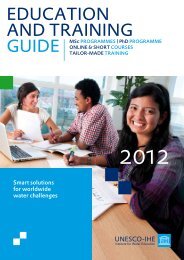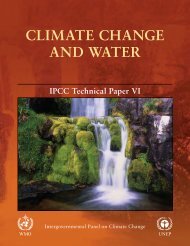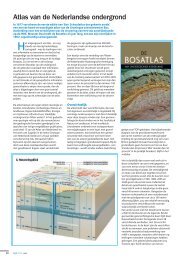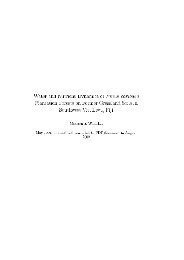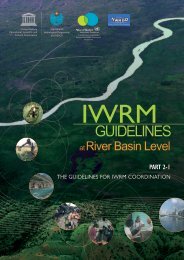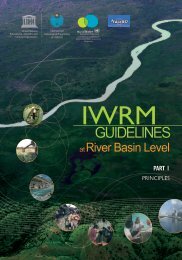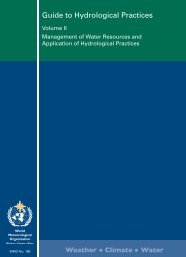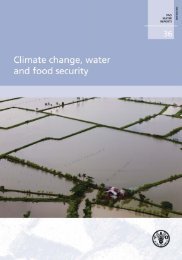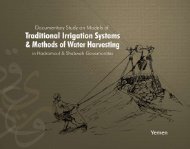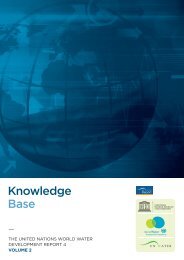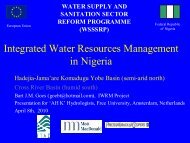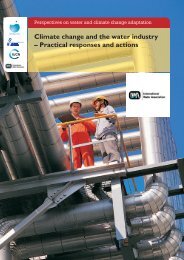Non-renewable groundwater resources: a ... - unesdoc - Unesco
Non-renewable groundwater resources: a ... - unesdoc - Unesco
Non-renewable groundwater resources: a ... - unesdoc - Unesco
- No tags were found...
Create successful ePaper yourself
Turn your PDF publications into a flip-book with our unique Google optimized e-Paper software.
NON-RENEWABLE GROUNDWATER RESOURCESmajority vote. An integrated regional information system was developed with the support of theCenter for Environment and the Development for the Arab Region and Europe (CEDARE). On5 October 2000 the four Member States signed two agreements on procedures for data collection,sharing and access to the data system.Since 1999, cooperation efforts have also been ongoing with regard to the SASS. Recentlythe three countries have agreed to set up an institutional mechanism for cooperation consistingof a small secretariat attached to the inter-governmental Observatoire du Sahara et du Sahel(OSS). Such a secretariat will ensure continuity of cooperation in hydrogeological data collectionand aquifer modelling, in support of domestic planning and decision-making by the concernedcountries.Groundwater on the agenda of the ILCAlso at the global level there are encouraging indications regarding the development of international<strong>groundwater</strong> law. The ILC incorporated in 2002 the topic of ‘Shared Natural Resources’,comprising <strong>groundwater</strong>, oil and gas, in its long-term programme of work.. Three reports werealready submitted on the sub-topic of transboundary <strong>groundwater</strong> (2003, 2004, and 2005). Inhis last report (UN Doc. A/CN.4/551), which was well received by the members of the ILC, theSpecial Rapporteur proposes a full set of draft articles for the management of transboundaryaquifers. He introduces the equitable and reasonable use principle, the no-harm rule, a provisionon monitoring, and a series of articles on the protection, preservation and management and onactivities affecting other States. A specific provision on non-<strong>renewable</strong> <strong>groundwater</strong> is presentedidentifying the obligation on aquifer States to ‘aim to maximize the long-term benefits derivedfrom the use of the water ...’ Aquifer States ‘are encouraged to establish a development plan’ fortheir non-<strong>renewable</strong> <strong>groundwater</strong>, ‘taking into account agreed life span of such aquifer oraquifer-system as well as future needs of and alternative water sources for the aquifer States.’(draft article 5)Recent efforts of cooperation over transboundary aquifers and the work being achievedat the ILC may be the sign of a slow evolution and concern in the international arena on thesustainable management of such water <strong>resources</strong>. Specific attention is being given to non<strong>renewable</strong>gourndwater <strong>resources</strong>. However, successful international cooperation requires theavailability of a functioning domestic legal and institutional framework in the countries concerned,including adapted regulatory and economic tools for pollution control and demandmanagement of non-<strong>renewable</strong> <strong>groundwater</strong> <strong>resources</strong>.Bibliographic references56BURCHI, Stefano and MECHLEM, Kerstin (eds.) 2005. Groundwater in International Law: Compilationof Treaties and other Legal Instruments, FAO Legislative Study No. 86. FAO/UNESCO, Rome/Paris .BURCHI Stefano and NANNI Marcella, 2003. How Groundwater Ownership and Rights InfluenceGroundwater Intensive Use Management, in; Intensive Use of Groundwater, Challenges andOpportunities, Ramón Llamas and Emilio Custodio Eds., Balkema, pp. 227-240.CAPONERA, Dante A., 1992. Principles of Water Law and Administration, National andInternational. Balkema, Rotterdam.




